Life in Kharkiv: Ukraine’s second largest city during wartime
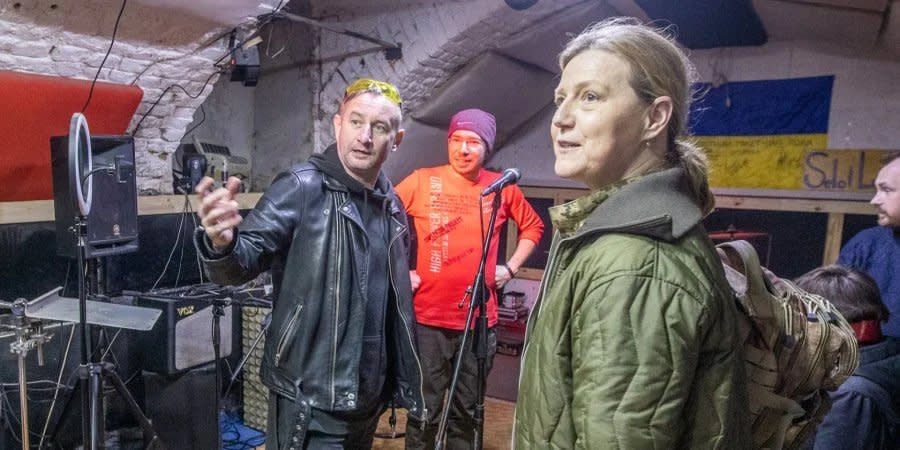
Serhiy Zhadan, a well-known writer, public figure, and musician, moderated the event, which brought together local artists, volunteers, journalists, and territorial defenders into the safe underground space. Zhadan has been living in Kharkiv since the beginning of the war – organizing charity concerts, raising money for the military, and transporting aid to the fighters in the oblast.
NV visited Zhadan’s bunker together with a guest from Kyiv — Minister of Veterans Affairs Yulia Laputina, who was visiting the city on official business.
Laputina is a long-time government official – she had worked at Ukraine’s SBU security service since 1992, and took part in the Kyiv government’s efforts to manage unrest in Crimea in 1994. 20 years later, in April 2014, she was involved in suppressing the Russian-back puppet “separatists” in Donetsk, while she was based out of the Kramatorsk airfield.
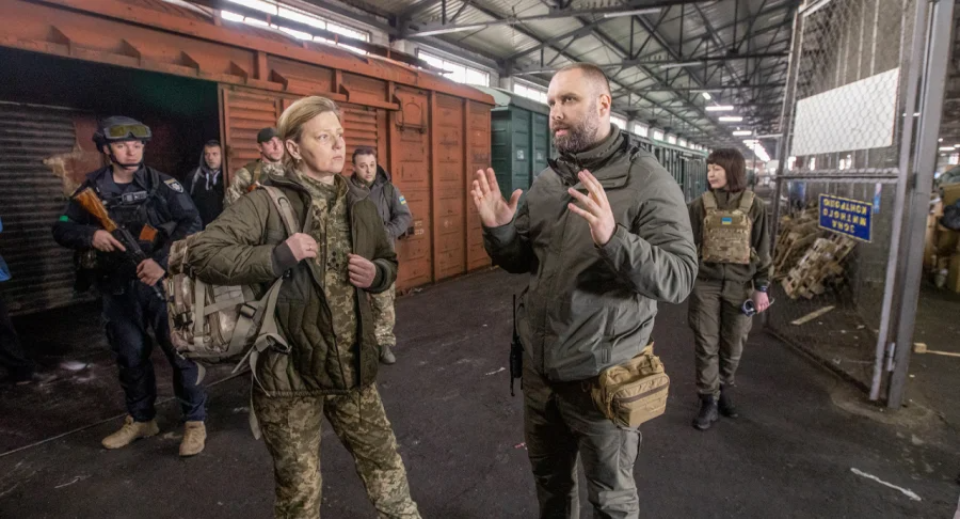
The war with the Russians has a personal dimension for her — in 2019, her son-in-law, a member of the SBU special forces, died in Donbas.
In 2020, the experienced counterintelligence officer received the rank of Major General, becoming the second woman in the history of independent Ukraine to be awarded the rank of general. That same year, she took over the helm of the Ministry of Veterans Affairs, responsible for handling the needs of Ukraine’s growing military veteran population.
Laputina's conversation with Zhadan began with the minister's recollections of her visit to the liberated town of Borodyanka in Kyiv Oblast.
"The rehabilitation center for veterans was smashed into pieces in the town,” the Minister remembered.
“Two people died. The director of the center sat on a chair near the ruined apartment building for three days and waited for the rubble to be cleared: the bodies of her sister and niece were taken out from underneath.”
Then Laputina recalled how she had visited the humanitarian aid headquarters in Borodyanka, where psychologists work with the local population.
"I talked to a boy there,” she said.
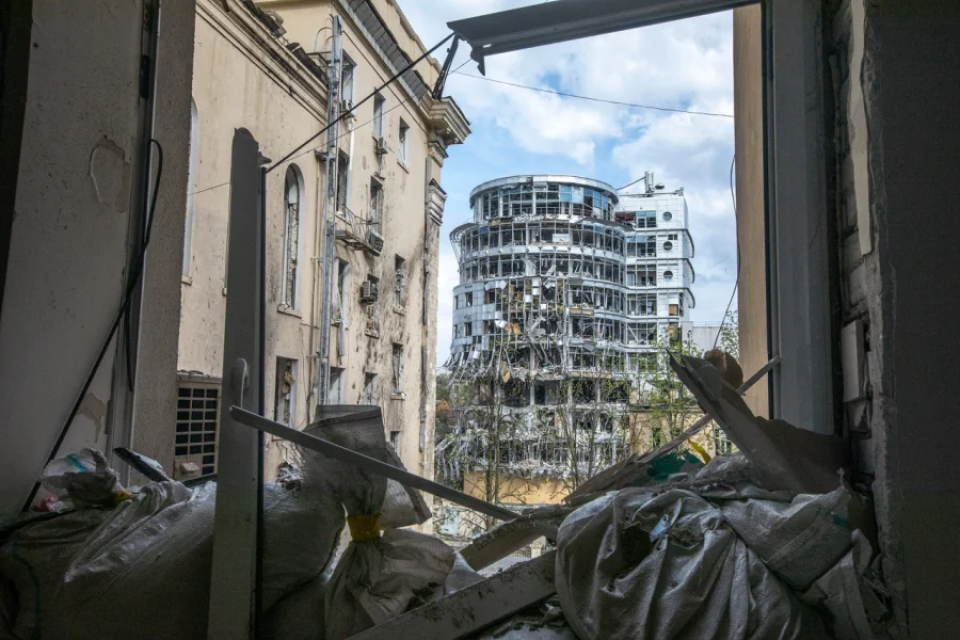
“He is 9-10 years old. And he says: How could it be that the monument to [national poet] Taras Shevchenko was shot in the head? That is, the child does not mention that he lacks food and shelter. The boy cannot get his head around the fact that Shevchenko can be shot in the head. These are values.”
Zhadan picked up on the topic: "We have a guy here who safeguarded a monument to Shevchenko [from shelling] in Kharkiv. Monuments have been shielded — it's psychologically important."
"This is a war of civilizations," the poet went on.
“When the occupiers restored the monument to Lenin in Henichesk, it was very telling. They found it somewhere."
Laputina mentioned her speech at the Kharkiv Security Forum in 2019, which she had titled the Semantic War of the Russian Federation against Ukraine, where she spoke about Moscow's rejection of Ukraine as a state and Ukrainians as a nation.
"It's a war of values,” the Minister emphasized.
“They do not want us to exist.”
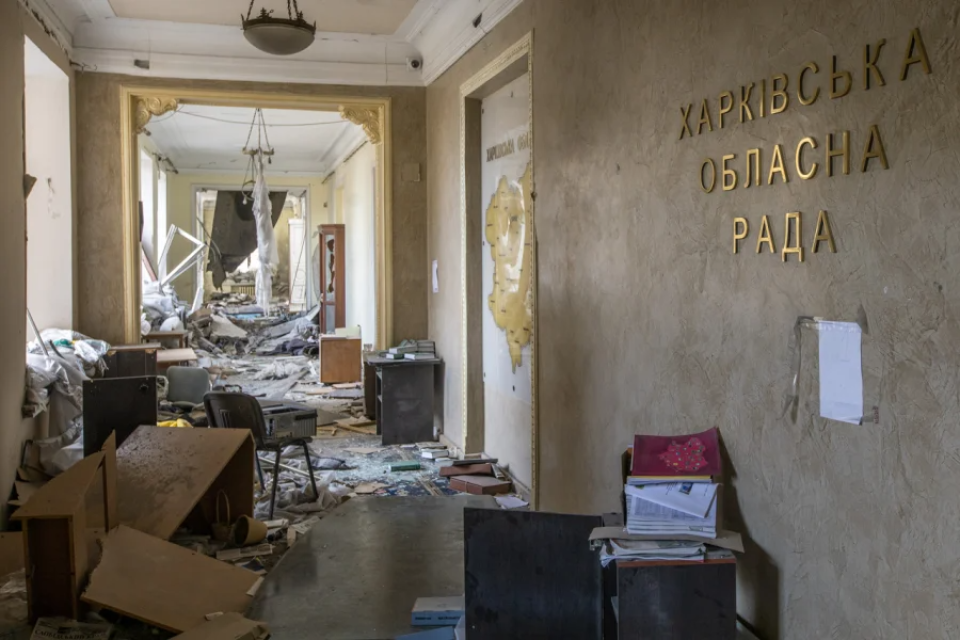
After this brief conversation, Zhadan approached other guests at the concert, and the minister began talking to local bloggers in the city, who have been involved with opposing Russian propaganda for many years.
Defending Kharkiv
During the meeting between the Minister and poet in the bunker, Zhadan called Kharkiv a fortress.
And indeed, this is exactly the atmosphere in the city: almost all its inhabitants are in a hurry, doing something, packing things up, taking them away.
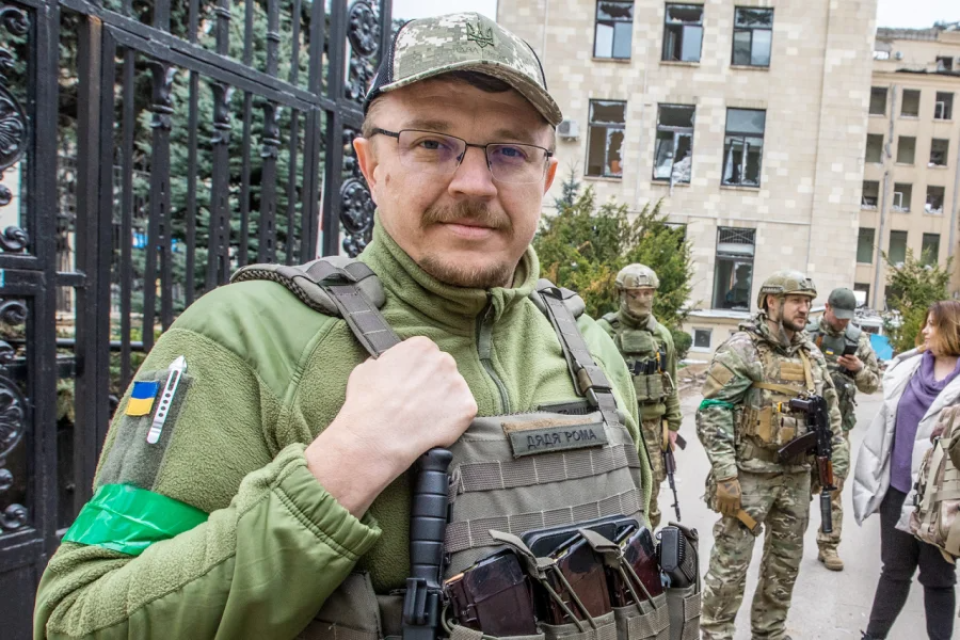
That's despite the fact that public transport in Kharkiv is currently not operational — there are only cars out on the streets.
The city center is nearly deserted and has been badly damaged by Russian shelling. But there is a noticeable population of people in the residential districts.
On March 1, the Russians fired a rocket at the building of the Oblast State Administration and the regional council, rendering it unusable / Photo: Oleksandr Medvedev
Explosions, and other sounds of war, can be heard over the city from time to time, and the siren of the air raid alert is a frequent companion. At the same time, the municipal utility services are still working hard — for example, planting flowers in the flowerbeds that line many of Kharkiv’s streets.
Laputina had numerous meetings in Kharkiv: with the regional leadership, with the military, and with volunteers.
Oleh Syniehubov, head of the Kharkiv Oblast Military Administration, said that there were 15 shelling attacks over the course of the night.
“122 mm caliber, 152 mm caliber. Multiple rocket launch systems: Grad, Tornado," Syniehubov says, listing off the different weapons the Russians are lobbing at the city day and night.
Syniehubov stressed that the Russians are fighting exclusively in the residential areas of the city, as well as in the historic center — that is, where there is no military infrastructure. But Kharkiv is firmly defended and the enemy has zero chances here, the local governor added with conviction.
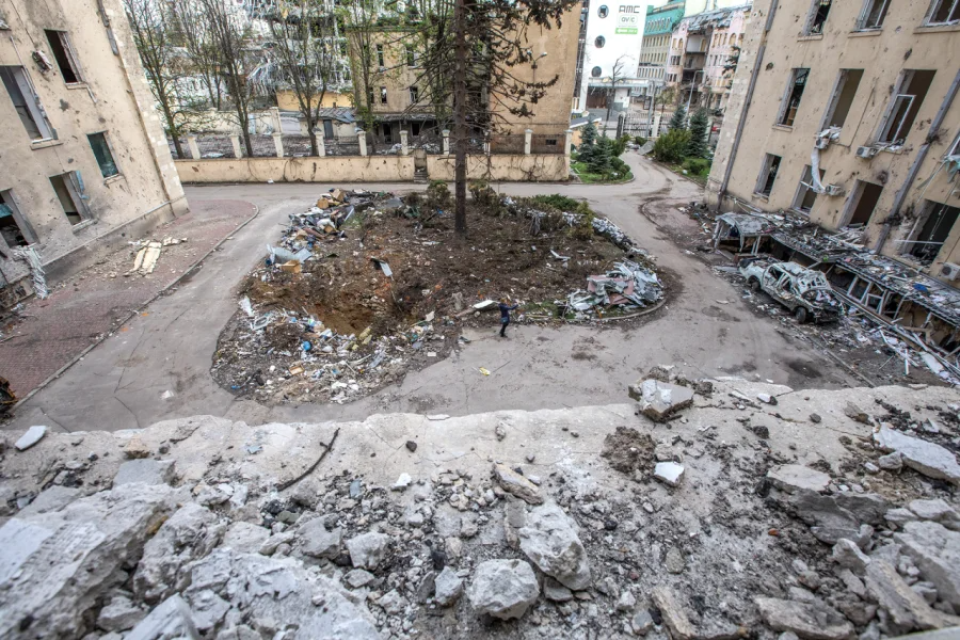
In the oblast, the situation is more complicated: the flash point is the Izyum axis, which is being stormed with enemy troops. More than 55,000 civilians have already fled the area.
"How do you feel when you look at the large-scale destruction inflicted by the Russians on your city?" we asked Roman Hryshchenko, commander of the 127th Detached Brigade of the Kharkiv Territorial Defense Forces, who had just met with the minister.
"Malice. And, perhaps, pity for the inferior intelligence of those who did it. But mostly anger," he replied.
After the victory, Kharkiv will be rebuilt quickly, Hryshchenko stated, because there are so many people in the city who love their home.
After this, Laputina proceeded to speak with Kharkiv’s defenders about the security situation in the city, in private.
NV, meanwhile, accompanied by a territorial defender, visited the middle part of the building of the Kharkiv Oblast State Administration, which was hit by Russian missiles on March 1, killing 29 people.
What we saw was shocking: in the rooms previously full of life, there is almost dead silence — only the sounds of the shelling of the city can be heard. Everything was destroyed: only the walls, ceilings, and stairs survived.
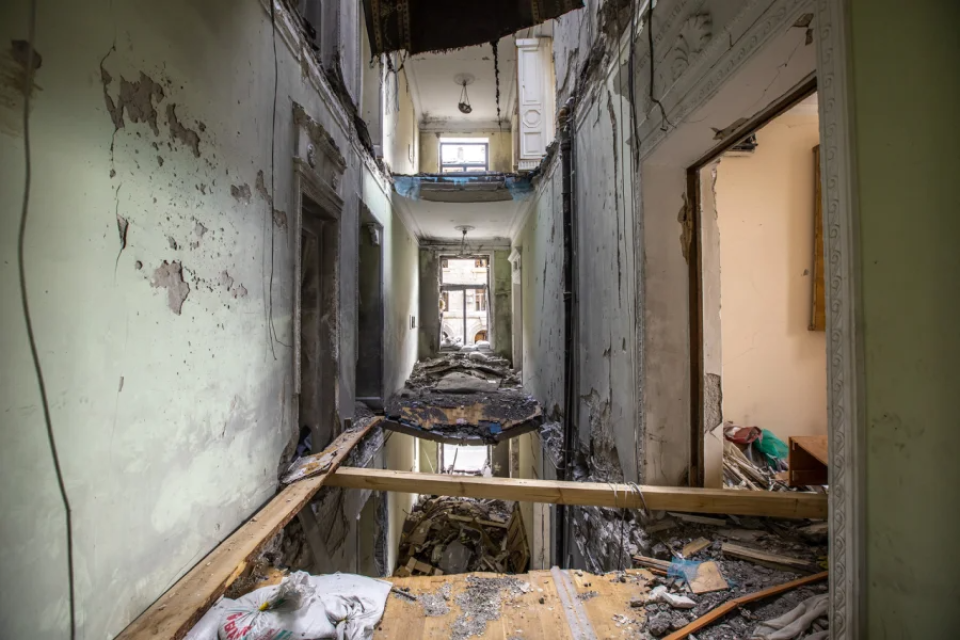
Conversation with the minister
Near another destroyed house in the center of Kharkiv, NV was able to speak to the minister, who was just finishing her visits for her official trip.
NV: In 2014, you took part in events in the east, saw the war with your own eyes. What impresses you most about the current full-scale Russian aggression?
Yulia Laputina (YL): First of all, the Ukrainian people, who so heroically defend their will and independence, are impressive. Russia stands no chance of victory, because everyone has united: ordinary people, volunteers, the government, the army. It is now clear that the Ukrainian nation has been born. It was being birthed for many decades or centuries in torment, now it has united and has been born.
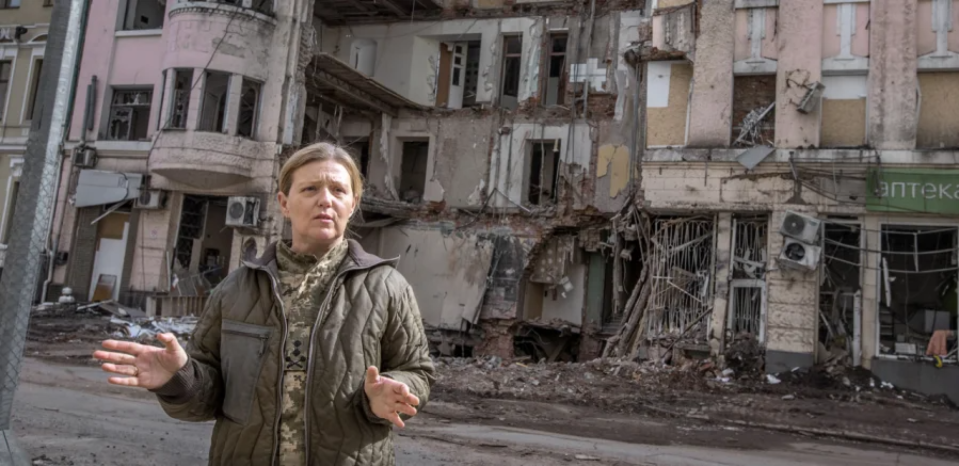
The Russians are not aware of this. Russia's biggest doctrinal mistake is that all its leaders, analysts, and military did not pay attention to one essential thing —that the Ukrainian nation does exist. Our civic identity has been born in these months.
NV: In some places, Russian soldiers committed real atrocities. You have worked in the secret services for almost 30 years — did you expect such a level of terror from the Russians?
YL: The first two wars in Chechnya, they exhibited the same things — they victimized the people. Since Ukraine's independence, we have had to take a systematic and analytical approach to the Russian threat. It existed from the beginning.
I have repeatedly said that the secret services and counterintelligence reported to the country's leadership [about this]. It was necessary to take into account the analytical and operational materials reported by counterintelligence throughout its existence. But no one paid attention. Back in 2008, we foresaw the separation of Crimea and the Crimean threat.
It was necessary to pay attention [to these things] and improve our defensive capabilities. To act not only along the border, but also within the country, to create safeguards so that the Russian agency of influence does not penetrate state bodies, so that covert schemes to reduce the level of economic security of the state are not made, and so on. And thus at all levels: political, economic and social.
Read also: Russian troops advance in Kharkiv Oblast, capturing another settlement — General Staff
Now Russia has shown its true face to the world. Unfortunately, this is very tragic for Ukraine — we have lost many people.
The most important thing is to preserve our human potential; cities can be rebuilt. The lives of our citizens are of value, unlike in Russia. The Russians do not value life, they do not take their soldiers off the battlefield, they commit atrocities.
This phenomenon of atrocity must be studied. I was in Borodyanka, where our rehabilitation center for veterans was completely destroyed by direct tank fire. I proposed creating a temporary center for psychological assistance in its place — not only for veterans, but also for ordinary civilians. And in the future, to create a Center for the Study of Mental Health, where internationally-known psychologists, therapists, and psychiatrists could study how a person can become such a creature.
NV: A beast?
YL: Not even an animal. Beasts do not do that. I always say that the wolf does not hunt down 10,000 hares. It hunts one for survival and that will suffice. And here comes a creature that not only kills, but rapes children and women.
Read also: Russia relocates entire factory from near Kharkiv, sets up concentration camp in its place
NV: We are now in Kharkiv, behind us are civil infrastructure structures that have been destroyed. The enemy was unable to capture the city, but continues to bomb it daily. Why? What do the Russians want to accomplish with these tactics?
YL: The tactics of hostilities have changed. They did not succeed in three days or even seven days [to capture Ukraine], because we are resisting. We have built up our military capabilities over the past eight years of war. Our army is very powerful, our air defense systems are working and so on. They suffered their first defeat.
Now [the Russian military] like a wounded beast, snapping at anything that gets in its way. They want to intimidate us with these bombs, this unsystematic shelling, hoping to keep us unaware of where they will hit next. Their art of warfare is a fake and a bubble that has been inflated for many years. They terrorize the population.
Now there will be some tectonic shifts inside the Russian leadership, because some of them pretended lies were truths, some provided operational military intelligence, and some completely misled the leaders who decided to attack Ukraine. The culprits will have to be identified, because Russia has no victories in this war. Only Ukraine wins.
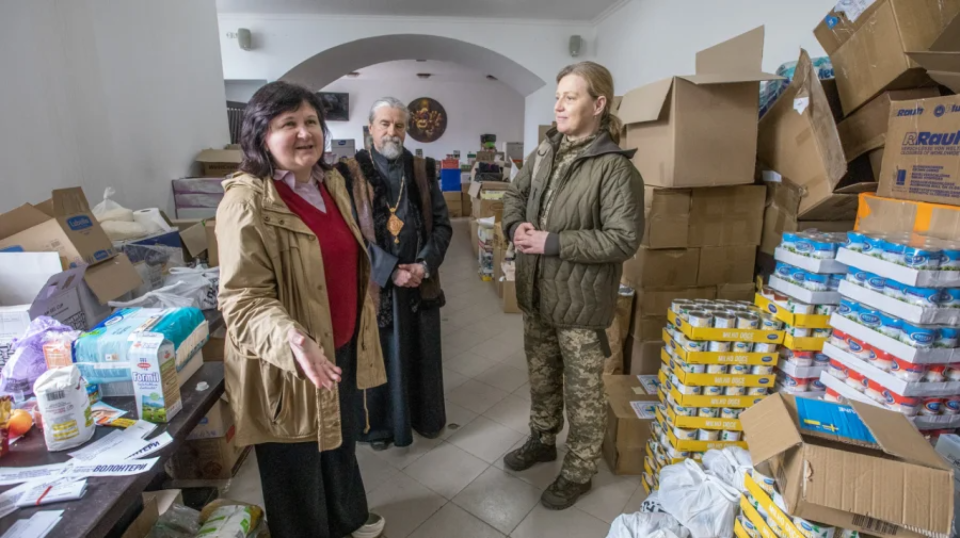
The only thing we feel very sorry for is our people, whom we are also losing: both civilians and soldiers.
NV: After the war, we will have a huge number of veterans. How is your ministry preparing for the new conditions?
YL: We have already made several changes in legislation, together with the parliamentarians. At the request of members of the families of fallen heroes, the basic law on social protection of servicemen has been amended and supplemented with the terms "member of the family of the deceased defender of Ukraine." This makes it possible to obtain all the social guarantees that are available.
We have also made changes to legislation, so that members of volunteer formations can receive the full-fledged status of a participant in hostilities throughout Ukraine. At the beginning of the war, no one knew where the theater of hostilities would turn.
Then the procedure was such that the status would be granted only to those who directly participated in hostilities. There must be justice, and the procedure must be fairly transparent.
For the future, we are already working with the Ministry of Social Policy and the Ministry of Health, to radically reform the approach to social guarantees for defenders of Ukraine, given that these are people aged 18 to 65. When they come to their communities after the victory, they will be socially active.
Opportunities need to be provided to support the development of small businesses, and perhaps some other initiatives that can be supported at the community level.
We must give veterans the opportunity to work, thus supporting their family and Ukraine.
Read also: Russian troops reportedly afraid to attack on Kharkiv axis, according to intercepted audio
NV: What do Ukrainians need to win?
YL: We need more weapons, both heavy weapons and air defense systems. Ukrainians have everything else — strength and will. There is responsibility for our country, for our families. And we have the key thing — the desire to win.

